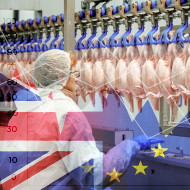
Charity responds to NFU comments regarding deregulation
The RSPCA has warned against the deregulation of farm animal welfare standards in the event of a no-deal Brexit.
The warning comes after the president of the National Farmers’ Union (NFU) said that to compete with cheap, low-quality animal products which could pour into Britain in a no-deal Brexit, the Government’s only option will be to deregulate the industry.
Until recently, the Government has committed to maintaining or raising the UK’s animal welfare standards once the UK leaves the European Union. But the RSPCA fears that, in a no-deal scenario, the UK may seek to import food from other countries like the USA, where animal welfare standards are not in line with the UK.
It says that in the increasingly likely scenario of a no-deal Brexit, the UK would be under pressure to accept farm products produced which are lower or even illegal for British producers. The only way to compete with the influx of cheaper chicken, the NFU president has said, is to deregulate the industry.
“Chlorinated chicken and hormone-fed beef on our supermarket shelves is now much closer to being a terrifying reality,” said RSPCA head of public affairs David Bowles.
“We have always said that a no-deal Brexit could result in a race to the bottom in terms of animal welfare standards and, worryingly, the Government’s promise to maintain those standards sounds increasingly hollow. If the farming industry does deregulate because of a no-deal Brexit, food products which are currently banned from being sold anywhere in the EU due to the unacceptable method of their production will be allowed to be sold in the UK.”
He continued: “Eight out of 10 people believe that animal welfare laws in the UK should be improved or at least kept at the same level after the UK leaves the EU. If the Government is serious about ensuring the long-term survival of the UK’s farming industry, the UK should be building on its reputation for gold standard farm animal welfare.
“Scrapping farm animal welfare regulations and lowering welfare standards cannot and must not be the answer.”
The RSPCA is calling on the Government to plan for long-term sustainability. This means maintaining and strengthening regulation, ensuring the viability of high welfare schemes and building consumer demand by extending the method of product labelling.
The animal welfare charity would also like to see the commitment to protecting the UK’s domestic animal welfare standards enshrined in law under the Agriculture and Trade Bills and all current animal welfare laws, at the very least, to be kept to the same standard.



 The latest
The latest